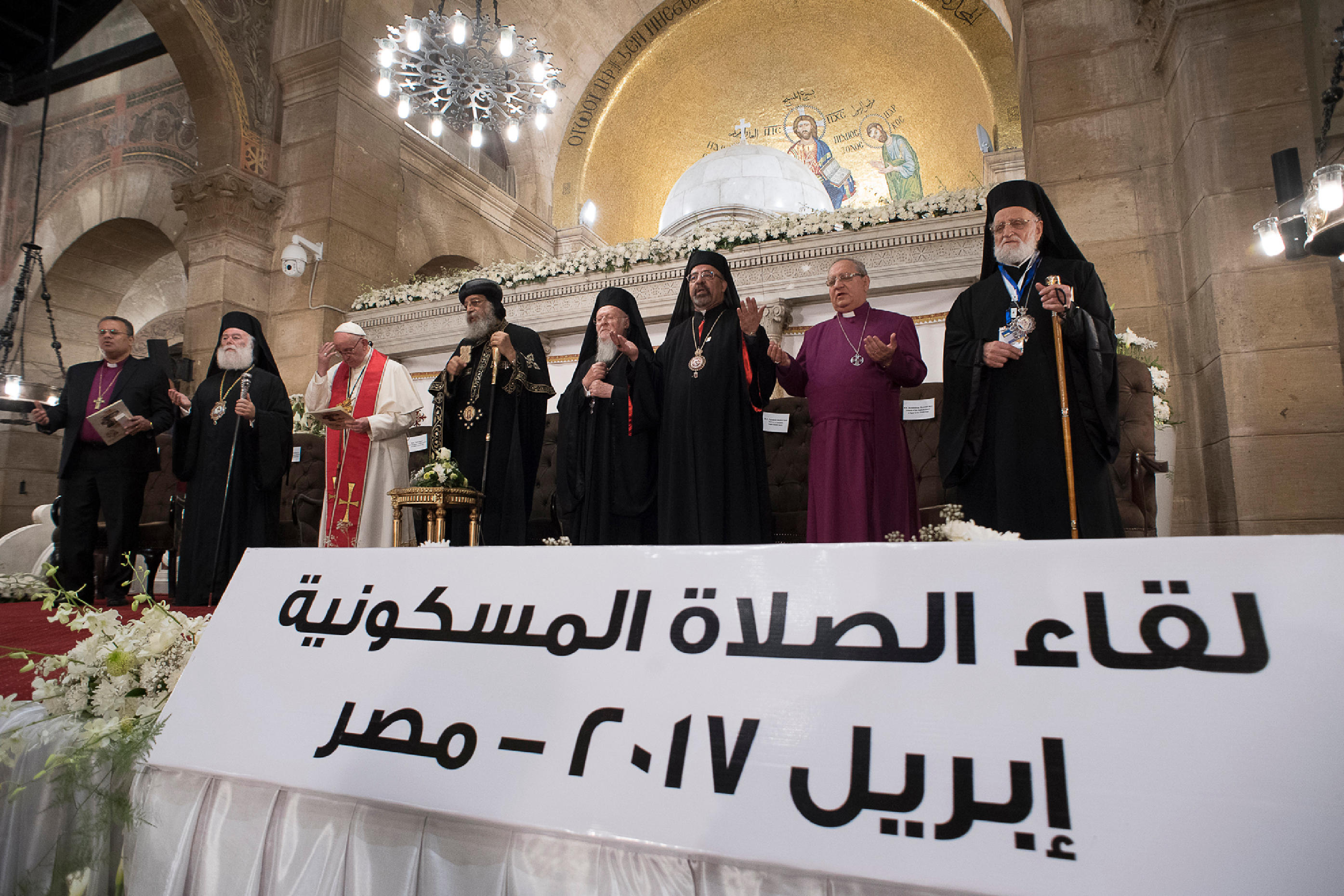Reflection
All those who have had the opportunity, in one way or the other, to come near the gestures and words of this pilgrimage – as the Pope defined it – have realized that they have drawn closer to the Gospel, the Good News, determined to seek the “good news” concealed near and far, thereby instilling thrust, encouragement and hope. It remains “good news” also when it unmasks evil, putting it into checkmate.

A “disarmed” Pope, on a non-bullet-proofed car. This decision hit front page news worldwide a few days before Pope Francis’ departure for Cairo and it inevitably raised concerns. Perhaps that same preoccupation was felt by the travelling companions of another Francis, the Poor Man of Assisi, when he left for Egypt to meet the Sultan, only “armed” of his habit, his smile, and a deep, unfaltering faith in Christ, Prince of peace.
How could Francis could not have done the same, 800 years later?
This raised concerns but it also strongly reaffirmed Pope Francis’ sole, heartfelt concern, conveyed in his continuing appeals to human conscience, namely
His preoccupation for peace.
The only possible answer to all provocations, to all forms of violence, to every absurd persecution obstinately perpetrated in the name of an equally absurd “god”, purposely written in small letters, is dialogue. Indeed the root of violence is evidently embedded in the heart of man, and perhaps in the hearts of all men; but the same should be said of the roots of what is good, that very goodness that man seeks for himself and his kin, although sometimes in a deviated manner. This is precisely where I perceive that very need for dialogue that Pope Francis – and not only him – repeatedly indicates as the only possible option: dialogue between partners, between faiths, between nations (during his return trip the Holy Father opportunely appealed to find a diplomatic solution to all political and military crisie). Moreover, dialogue should equally involve the hearts of us all.
For each man, created in God’s image and likeness, has the inherent vocation to dialogue along with the ability to distinguish true goodness from what is blatantly evil.
It is the goal of honest dialogue (albeit all dialogues are honest by nature, if not, it would be a huge contradiction in terms): to help every man look deep inside himself and thwart all drives to closure, egoism, and even violence, which we all carry within ourselves in varying degrees, in order to voice the thirst for goodness and meaning which is equally present in all human lives.

Pope Francis tirelessly repeats it with a positive outlook, starting from the enhancement of the signs of goodness inscribed in all men and in all cultures: from the memory of Egypt’s great civilization, “land of prophets and covenants”, as he defined it, to the understanding of Islam as a religion that knows how to speak of peace, as evidenced in the Muslim traditional salute “may peace be with you”, rephrased in the words of the Pope on several occasions, reminding us that it’s not up to us to “protect” God, with the risk of distorting His image according to our goals, but that He protects humankind by creating the conditions for peace established by humankind, in the likeness of the very Creator of peace; to the embrace with Coptic Orthodox Pope Tawadros II, a solemn reaffirmation of the need for communion, felt ever more strongly by Christian faithful:
All those who have had the opportunity, in one way or the other, to draw near the gestures and words of this pilgrimage – as the Pope defined it – have realized that they have drawn closer to the Gospel
which is Good News in its determination to seek the “good news” concealed near and far, thereby instilling thrust, encouragement and hope. It remains “good news” also when it unmasks evil, putting it into checkmate.
Wasn’t this precisely what happened during Pope Francis’ addresses at al-Azhar University and at the Government’s Palace? As expected, the Pope condemned terrorism and all forms of violence – how could he not?
But at a closer reading, it becomes clear that Francis did not mince his words to the Western world: demagogy, weapons manufactured and traded and hence bound to be used sooner or later, populisms, risks of identities unable to welcome what is new, closed in on themselves, doomed to loose vitality. Those themes are the core issues confronted by Western societies today.
Those words appear to infer that the faults are not entirely on one side. Extremism can also be fought by speaking with clarity, by recognizing that everyone is marked by a certain degree of incoherence, and by working for an authentic conversion that we ourselves draw forth, not others. With the firm reminder – firstly to ourselves – that the only form of extremism welcomed by God is the extremism of charity, sometimes endearing and seemingly useless, but always authentically revolutionary.
(*) Director of the National Office for Ecumenism and Dialogue of the Italian Bishops’ Conference (CEI)